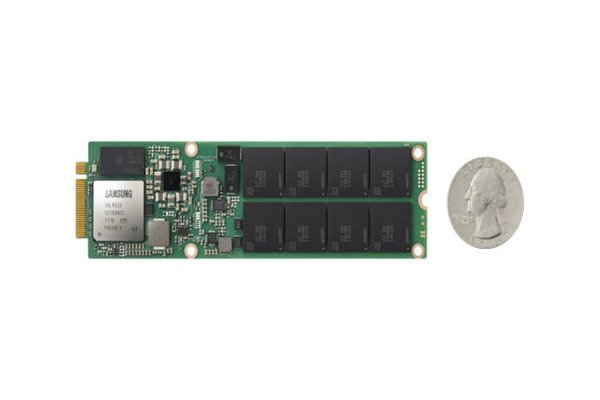Samsung Electronics introduced innovative memories such as 1 terabyte (Tb) 3D V-NAND flash memory and others. 1Tb is currently the world’s largest storage capacity.
At ‘Flash Memory Summit 2017’ that was held in Santa Clara Convention Center on the 8th, Samsung Electronics introduced 1Tb V-NAND flash chip, which is the world’s largest storage capacity, NGSFF (Next Generation Small Form Factor) SSD (Solid State Drive) that can increase degree of integration of a server system, Z-SSD that dramatically improved performance of current SSDs, and Key Value SSD that is applied with new data storage method. Because 2 terabytes can be made through single memory package when 16 1Tb V-NAND flash memories are stacked on top of each other, storage capacity of SSD can be increased dramatically. Samsung Electronics is planning to make SSD that is applied with 1Tb V-NAND flash memory available in 2018.
NGSFF SSD is a new standard that can maximize use of a space of a storage device within a server system. If a system that is composed of M.2 SSD is replaced with NGSSF SSD, storage capacity can be improved by four times. At this summit, Samsung Electronics introduced 576TB system with 16TB NGSFF SSD 36. NGSFF SSD will be mass-produced starting from this fourth quarter and it will be standardized by a standardization organization called JEDEC during first quarter of 2018.

Z-SSD’s read latency time is 15µs, which is 7 times faster than current NVMe (Non-Volatile Memory express). In an environment where reading and writing are repeated, its response time is up to 12 times faster than NVMe. Samsung Electronics introduced Z-SSD for the first time at last year’s Flash Memory Summit and is currently discussing with variety of customers regarding partnership.
Key Value SSD is a new product that is specialized for storing atypical data (texts and videos). Current SSDs have to convert data into particular size when storing data. It is possible to increase lifespan of SSDs and input/output speed since variety of data can be stored as they are since conversion process is not necessary when Key Value SSD is used.
“We are going to respond to demands for high-tech semiconductors such as AI (Artificial Intelligence) and Big Data in the future by continuously developing solutions related to V NAND.” said Department Head (Vice-President) Jin Kyo-young of Samsung Electronics Memory Business Department.
Staff Reporter Han, Juyeop | powerusr@etnews.com